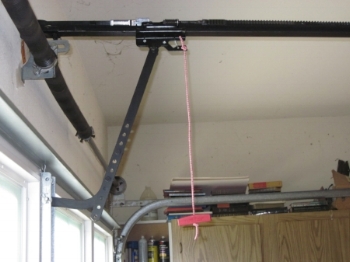COULD YOUR GARAGE DOOR KILL YOU?
By Edie Alderette-Sellers
PR-CERT
One of the more disturbing take-away messages of the recent Wine Country blazes — and one that fire officials are worrying about — were problems with garage doors.
Garage-door openers: A convenience that could kill.
Automatic garage openers are a wonderful convenience. Press a button and the doors magically lift with no muss, no fuss. We love to have them in our homes, and they're especially convenient for the frail, elderly, or anyone who may lack the strength to open a heavy door by hand.
But we rarely consider that, without power, garage doors can block an important exit. If we can't open them when the power goes out, we may be trapping our vehicles and ourselves in a burning building.
That is reportedly what happened to several victims in the Santa Rosa and Sonoma County fires. According to fire officials from the Richmond Fire Department we've spoken to, many of the 43 deaths that occurred in the fires were the elderly, and a portion of them died in their garages just behind a closed garage door. Officials believe these victims didn't know how to open an automatic garage door manually or lacked strength to lift them.
How do you protect yourself and your loved ones from being trapped by an automatic garage door opener?
Learn how to open them manually or get a battery backup.
Opening your garage door by hand
Manually opening a door is easy for the able-bodied. All electronic or automatic garage doors have a bypass to allow the door to be disengaged from the motor. Somewhere on the chain that operates the garage door should be a cord hanging from the bracket of the chain. This cord should be red or have a red knob on the end. You may need a ladder to reach it.
The manual-release cord will disengage your door and allow you to lift it by hand.
Jerk the cord and it will release the door from the motor. Then grab the door with both hands and lift. If it doesn't budge, jerk on the cord again, harder and from different angles, until it releases and you can lift the door.
Once you've got the door open, do not let the door go because once you've disengaged it from the chain, there's no counterweight keeping it open. If you release, it will slam shut and could land on a person crawling out. Prop it open with something before anyone gets under it, if you can, and get out. If there's no time, Hold it open for everyone to leave and then have someone outside hold it open for you.
This is a drill you should practice because, in a panic, it would be very easy for those outside to start running and forget there's still a person inside who can't get out without assistance.
Battery backups are your safest bet
As you can see, if you have mobility or strength issues or if you are alone in the house, manually opening a garage door will be a challenge to do quickly to escape in an emergency. A better option is to make sure your garage door has a battery backup and, if not, get one retrofitted.
Battery backups are small 12-volt battery units that openers can use when a power outage occurs. Once the power goes out, a fully charged battery is designed to supply the door opener with 24 hours of standby power, or 20 full cycles of open-and-close. They take about 4 1/2 hours to charge.
Most newer garage-door openers have battery backups already on board or as an add-on option, including LiftMaster, Chamberlain, Mastercraft, Genie, and Linear.
A backup battery can be installed on some models or comes standard on most newer ones.
They aren't very expensive to add to a compatible garage-door system, about $100 or so, but they do need to be installed by a garage-door service professional.
But these options have only been around for the last decade or so; LiftMaster only began offering it in 2003. If your garage door opener is more than than 10 or 15 years old, you probably don't have one and you might not be able to get one added.
If your older garage-door opener doesn't have a backup-battery option, it's time to get a new opener, especially if you have children or elderly in the house. Openers with backup batteries already on-board are now an industry standard. They're easy to find through any home-improvement center or installer.
If you're planning to stick with opening your garage by hand, make sure you've tested the process several times and are familiar with how to do it and how long it will take. Make sure everyone in the house knows how to do it, too, because you might not be there if an emergency strikes.



